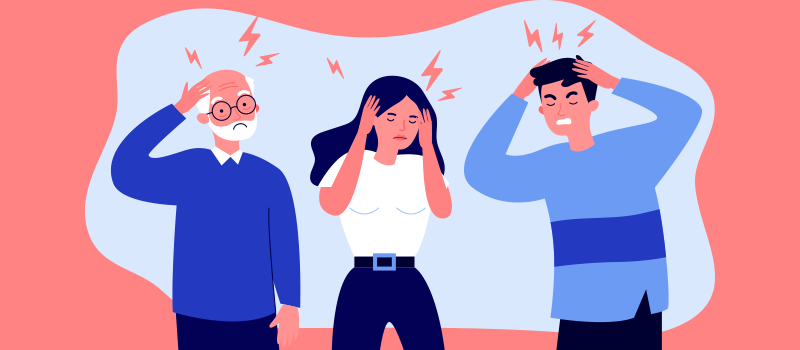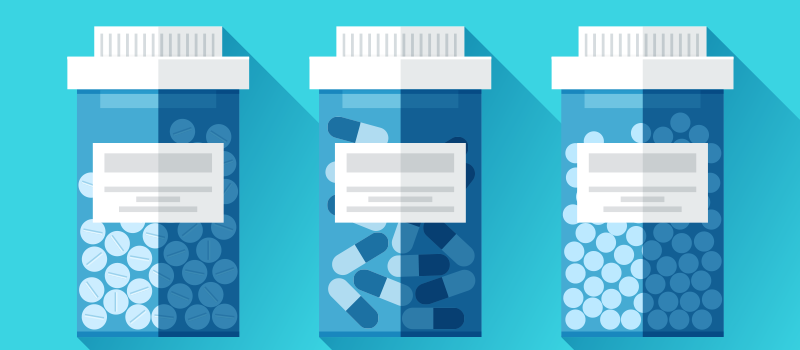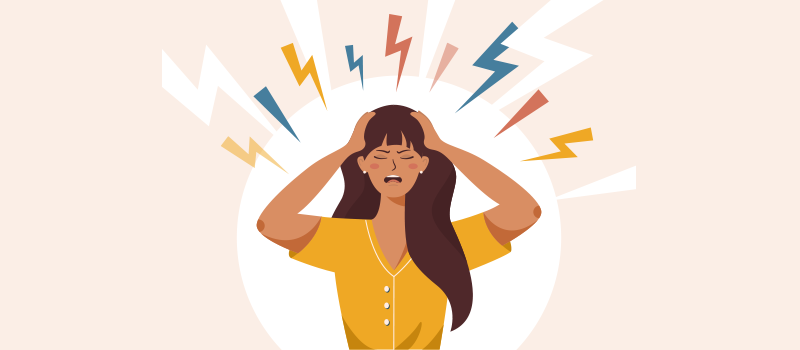What’s the Buzz
The Bee Healthy Blog
The Most Effective Migraine Medications

According to the National Headache Foundation and the American Headache Society, there are approximately 28 million migraine sufferers in the United States. Interestingly, 21 million of them are women, and 7 million are men. There is a migraine sufferer in 1 out of every 4 households in America. While there is no cure for migraines, effective migraine treatments are available. Abortive medications and preventive treatment can help to manage this headache disorder.
Please continue reading to learn more about the different medications used for the prevention and acute treatment of migraine headaches. Hopefully, it will help you understand your treatment options so that you can work with your doctor to choose the best migraine medications for you.
What are migraine headaches?
Migraine headaches consist of severe head pain, typically on one side. The pain is throbbing or pulsing in nature. It can occur along with other symptoms such as nausea, vomiting, visual symptoms, and light/sound sensitivity. Some people experience an “aura” just before a migraine headache, consisting of flashing lights, visual disturbances, tingling, or problems with speaking. Women sometimes have a menstrual migraine in association with their period.
Migraine pain can last for several hours, even days, making it difficult to do daily activities. However, there are several effective migraine treatments available. A neurologist (a doctor who specializes in the treatment of the brain, spinal cord, peripheral nerves, and muscles) can make a migraine diagnosis based on your history, physical examination, and imaging tests if required. Besides acute migraine treatment for immediate pain relief, preventive treatment is also available.
Treatment of Migraine Headaches
There are many different types of headache disorders, such as a cluster headache, chronic daily headache, sinus headache, and migraine headache. Migraines are characterized by recurrent attacks. The goal of migraine treatment is to stop current migraine attacks and prevent future episodes.
Medications used to treat migraine headaches broadly fall into two categories. First, pain-relieving medications are used for acute treatment, i.e., to stop symptoms or abort a migraine headache that has already started. Second, preventive migraine medications are taken regularly to reduce the frequency of migraine headaches.
Medications for relief of migraine headache
Migraine drugs used to relieve pain work best when they are taken at the first sign of a migraine attack.
Over-the-counter pain relievers
Several over-the-counter medications can be used to treat episodic migraines. The most common ones are acetaminophen (Tylenol) and nonsteroidal anti-inflammatory drugs (NSAIDs) like ibuprofen and naproxen (Advil, Motrin, Naprosyn). These are usually the first line of acute treatment for mild to moderate migraine headaches.
Some other over-the-counter medications for migraine relief, such as Excedrin Migraine, contain a combination of caffeine, aspirin, and acetaminophen. They can be especially helpful for mild migraine pain.
However, prolonged use of these medications for migraine symptoms can cause rebound headaches or medication-overuse headaches. Chronic use of NSAIDs can also cause other side effects like stomach ulcers, gastrointestinal bleeding, and kidney injury.
Other medications for acute migraine
Other migraine medications like triptans, ergot alkaloids, anti-nausea medications, and combination pain medications are used for abortive treatment of moderate to severe migraines. Some of these medications are second- or third-line therapies. Meaning, they are used in select patients based on headache severity or for refractory migraine (migraine headache that does not respond to first-line migraine medications).
Triptans
Triptan medications are prescription drugs available as pills, nasal sprays, and injections to treat migraine pain. They relieve migraine symptoms by blocking pain pathways in the brain. Examples include sumatriptan nasal spray (Imitrex) and rizatriptan (Maxalt). However, triptans may not be safe for all migraine sufferers, especially those at a high risk of heart attack or stroke.
Dihydroergotamine
This medication is available as an injection and nasal spray. It is effective when taken soon after migraine symptoms start. In particular, it is useful for migraine headaches that last more than 24 hours. However, dihydroergotamine can cause worsening nausea and vomiting as a side effect. It is not suitable for people with high blood pressure, coronary artery disease, liver disease, or kidney disease. Examples are Migranal and DHE 45.
Lasmiditan
This is a newer medication that is used to treat migraines. Clinical trials have shown it can significantly improve headache pain. It works by blocking pain pathways in the brain. Side effects include drowsiness and dizziness. You must refrain from driving or doing anything that requires mental focus for at least eight hours after taking lasmiditan (brand name Reyvow).
CGRP receptor antagonists
Ubrogepant (Ubrelvy) was the first calcitonin gene-related peptide receptor antagonist (CGRP receptor antagonist) approved to treat migraines. It is an oral medication found during placebo-controlled trials to relieve migraine pain plus other migraine symptoms such as light, sound sensitivity, and nausea. Possible side effects of ubrogepant include drowsiness and dry mouth. Examples of CGRP receptor antagonists include ubrogepant (brand name Ubrelvy) and rimegepant (Nurtec ODT). People who are taking drugs that are CYP3A4 inhibitors should not take CGRP receptor antagonists. A few examples of CYP3A4 inhibitors are itraconazole, clarithromycin, erythromycin, diltiazem, ritonavir, verapamil, and grapefruit products. Talk to your doctor or pharmacist to see if any of your current medications will interact with CGRP receptor antagonists.
Opioid pain relievers
Narcotic pain medications like oxycodone (OxyContin) or hydrocodone (Vicodin) may be prescribed to people who cannot take other medications for acute migraine. However, opioid medications are habit-forming and carry a high risk of addiction. Therefore, they should be used with caution under the close supervision of the prescribing physician.
Antiemetics
Some migraine drugs help to relieve other symptoms of migraine headaches such as visual disturbances, nausea, and vomiting. Acute medications for nausea and vomiting (antiemetics) include metoclopramide (Reglan), chlorpromazine (Thorazine), and prochlorperazine (Compro). They are usually taken along with pain-relieving medications.
Keep in mind that some of these OTC and prescription drugs for relieving pain are not safe for pregnant women. So if you are pregnant, could be pregnant, or plan to become pregnant, please tell your doctor before starting migraine treatment.
Preventive migraine treatment
Certain migraine drugs can be taken regularly for migraine prevention. Doctors usually prescribe these drugs to people who have severe, frequent, or long-lasting migraine headaches that do not respond well to acute migraine medications.
Preventive migraine drugs help reduce the frequency, severity, and duration of migraine attacks, i.e., they reduce how often you get migraine headaches, how bad they are, and how long your severe headaches last. Some medications used for migraine prevention are described below.
Medications used to treat high blood pressure
Certain blood pressure-lowering medications like beta-blockers (propranolol or Inderal, metoprolol or Lopressor) and calcium channel blockers (verapamil or Verelan) can help prevent migraines that come on with an aura. Migraines are associated with dilated (widened) blood vessels. The exact mechanism of how beta-blockers work to prevent migraine headaches is not well-known. At the beginning of a migraine, the blood vessels in the brain constrict, and this phenomenon signals the brain to think that it needs more blood, but in reality, it does not. This results in the dilation of brain blood vessels, causing more blood to rush to the brain, resulting in migraine pain. It is believed that beta-blockers and calcium channel blockers help prevent migraine headaches because they stabilize the brain blood vessels, thus, preventing their dilation.
Antidepressants
Some antidepressant medications like tricyclic antidepressants (amitriptyline) can be used as a preventive medication for migraine headaches. However, other antidepressants like selective serotonin reuptake inhibitors (SSRIs) are not effective in migraine prevention.
Anti-seizure drugs
Medications used to treat neurological disorders like epilepsy might help people with less frequent migraine attacks. Examples of antiseizure medications used for migraine prevention include topiramate (Topamax) and valproate (Depakote`). However, these drugs can cause side effects like nausea, dizziness, and weight gain. Also, they are not safe to take during pregnancy.
Botox injections
Some adults benefit from injections of onabotulinumtoxinA (Botox). The treatment needs to be repeated every 12 weeks or so if it is effective.
CGRP monoclonal antibodies
These are newer drugs approved by the FDA to prevent episodic migraine. They are given by injection every month or every 3 months. Examples of CGRP monoclonal antibodies used for preventing migraines include eptinezumab (Vyepti), fremanezumab (Ajovy), Erenumab (Aimovig), and galcanezumab (Emgality).
This migraine information page has been written to give you an overview of the types of migraine treatment available. To avoid rebound headaches and other complications, it is important not to self-treat migraine headaches. You should work with your doctor to identify the best migraine drugs for you. Your doctor can provide medical advice and recommend migraine treatments based on the frequency, severity, and duration of your headaches, as well as your other symptoms, such as visual symptoms. They may recommend preventive medications for severe or frequent migraines.
References
- https://www.mayoclinic.org/diseases-conditions/migraine-headache/diagnosis-treatment/drc-20360207
- https://www.aafp.org/afp/2018/0215/p243.html
- https://www.health.harvard.edu/blog/stopping-the-vicious-cycle-of-rebound-headaches-2019110718180
- https://americanheadachesociety.org/wp-content/uploads/2018/05/NAP_for_Web_-_Epidemiology___Impact_of_Headache___Migraine.pdf











SOCIAL